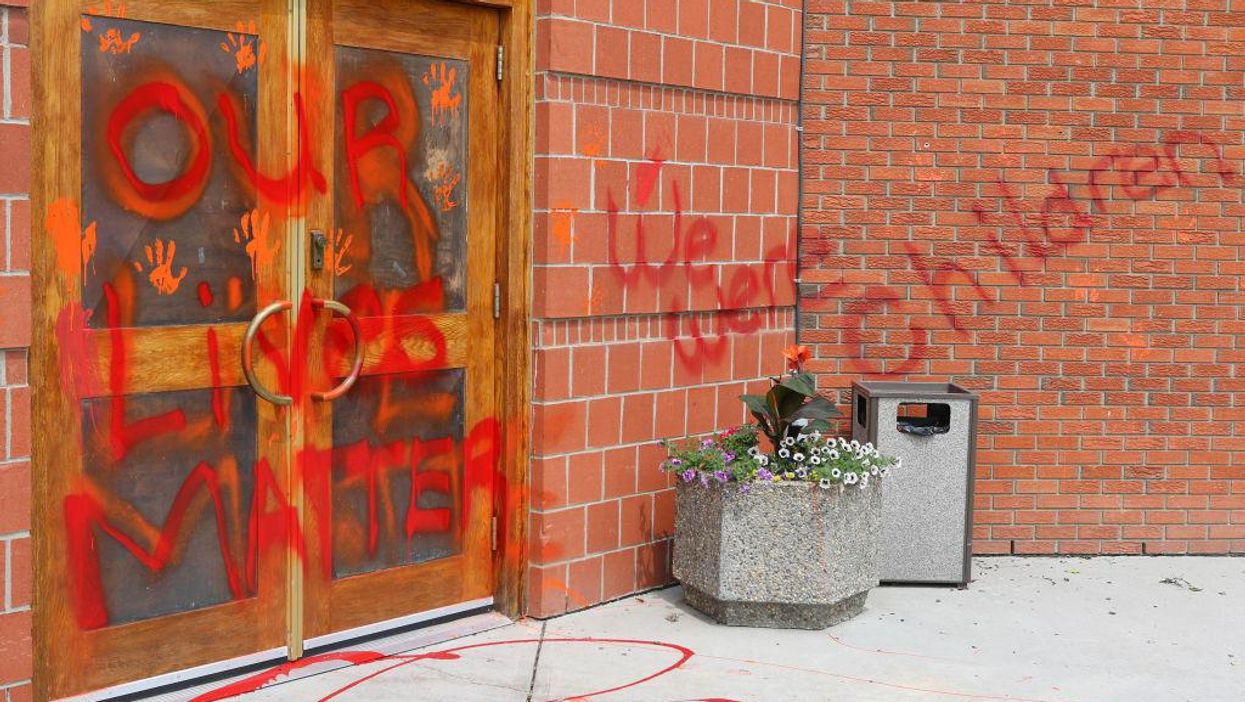
Dave Chidley/Anadolu Agency via Getty Images

As many as 45 Catholic churches in Canada have been burned or vandalized in a wave of anti-Christian violence sparked by the discovery of unmarked graves near former schools for Indigenous children.
The True North Centre for Public Policy, a nonprofit right-wing organization, has published a map on its website tracking reported incidents of church burnings and acts of vandalism committed on Catholic church property in recent weeks. According to the group, at least 17 churches have been targeted by arsonists. Dozens more have been defaced with red paint or vandalized in other manners.
These anti-Christian attacks have followed the discovery of hundreds of unmarked graves near residential schools where the Canadian government sent indigenous children as part of a forced assimilation program. Beginning in the late 19th century and lasting for 120 years, about 150,000 Indigenous children were forced to attend the schools, most of which were operated by the Catholic Church, where they were taught to reject their cultural heritage and assimilate into Canadian culture. Many of the schools were underfunded, did not provide adequate nourishment, health care, or clothing, and were overcrowded and susceptible to outbreaks of disease.
A 2015 report from Canada's Truth and Reconciliation Commission, a commission established to investigate and report on the history of the country's forced assimilation program and its lasting impacts, identified 3,200 confirmed deaths of students at the schools.
"The failure to establish and enforce adequate standards, coupled with the failure to adequately fund the schools, resulted in unnecessarily high death rates at residential schools," the report stated.
There is no known cause of death for approximately half the deaths identified by the commission. Among deaths attributed to illness, tuberculosis was the most common cause of death, followed by influenza and pneumonia.
To cut costs, most of the bodies of children who died at these schools were not returned to their parents. Part of the commission's work was to identify and commemorate the unmarked gravesites where these children were buried.
In June, an estimated 215 unmarked graves were found in Kamloops, British Columbia, near the Kamloops Indian Residential School. The discovery was made by the Tk'emlups te Secwepemc First Nation, using ground-penetrating radar that identifies changes in soil below the surface where graves may have been dug. In the following weeks, an estimated 600 more unmarked graves were found at the former Marieval Residential School in Saskatchewan and another 182 graves were found at the site of a former residential school on Ktunaxa Nation territory in British Columbia.
It is not clear if all of the discovered graves belong to children. According Jon Z. Lerat, a band councillor with the Cowessess First Nation, the area where graves were found in Saskatchewan was also used as a burial site by the rural municipality located there.
Cowessess First Nation Chief Cadmus Delorme emphasized to reporters that the discovery was "not a mass grave site," just "unmarked graves."
Still, the discovery of these grave sites prompted a wave of violence against Christian churches in Canada. In just one night on June 30, 10 different churches were vandalized in the city of Calgary.
"Orange and red paint was placed on the exterior of the churches and one had a window smashed so paint could also be thrown inside," the City of Calgary said in a news release.
"Handprints, the number '215' and other markings suggest the vandalism was in response to the graves recently found at former residential schools."
Two weeks ago, Canadian Prime Minister Justin Trudeau condemned the violence against churches, calling it "unacceptable and wrong."
"I can't help but think that burning down churches is actually depriving people who are in need of grieving and healing and mourning (of) places where they can actually grieve and reflect and look for support," Trudeau said.
"We shouldn't be lashing out at buildings that can provide solace to some of our fellow citizens," he said. "But we should be, every day, committing ourselves, each and every one of us, to the hard work that we need to do to actually rebuild a path forward that reflects the terrible intergenerational trauma and present day realities of suffering that we are all collectively responsible for.
"The anger ... is real," Trudeau continued. "People have gone decades and even generations living with intergenerational trauma, with outcomes and institutional racism that has created extreme difficulties for Indigenous peoples across this country that are also the legacy of residential schools."